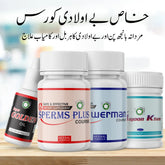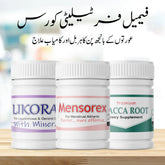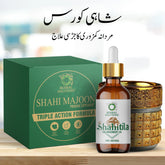Oligospermia Treatment: Natural Herbal Solutions for Low Sperm Count
What is Oligospermia?
Oligospermia refers to a medical condition characterized by abnormally low sperm concentration in semen. According to medical standards, oligospermia is diagnosed when sperm count falls below 15 million sperm per milliliter of semen. This condition significantly impacts male fertility and can make natural conception challenging for couples.
The condition exists on a spectrum, ranging from mild oligospermia (10-15 million sperm/ml) to severe oligospermia (less than 5 million sperm/ml). Understanding these classifications helps healthcare providers develop appropriate treatment strategies, including targeted herbal solutions that address specific severity levels.
For couples struggling with fertility issues related to oligospermia, specialized treatments like the Special Fertility Course offer comprehensive approaches to improving sperm quality and quantity through natural methods.
Common Causes of Oligospermia
Lifestyle Factors
Modern lifestyle choices significantly contribute to declining sperm counts. Alcohol consumption, smoking, and obesity are among the most widespread oligospermia causes. These factors create oxidative stress in the body, damaging sperm production and quality.
Excessive heat exposure from hot baths, saunas, or tight clothing can also impair sperm production. The testicles require a temperature slightly lower than body temperature for optimal sperm generation, making temperature regulation crucial for male fertility.
Medical Conditions
Various medical conditions can lead to oligospermia, including:
- Varicocele: Enlarged veins in the scrotum that affect blood flow and temperature regulation
- Hormonal imbalances: Disruptions in testosterone, FSH, or LH levels
- Infections: STIs or urinary tract infections that damage reproductive organs
- Genetic disorders: Chromosomal abnormalities affecting sperm production
- Autoimmune disorders: Conditions where the body attacks its own sperm cells
Environmental Toxins
Exposure to environmental pollutants, pesticides, heavy metals, and industrial chemicals can severely impact sperm production. These toxins accumulate in the body over time, creating long-term fertility challenges that require comprehensive detoxification approaches.
Recognizing Oligospermia Symptoms
Unlike many medical conditions, oligospermia often presents without obvious symptoms. Most men discover they have oligospermia only when they undergo fertility testing after experiencing difficulty conceiving with their partner.
However, some indirect symptoms may indicate underlying fertility issues:
- Difficulty achieving pregnancy after one year of regular, unprotected intercourse
- Changes in libido or sexual function
- Pain, swelling, or lumps in the testicle area
- Decreased facial or body hair growth
- Signs of hormonal imbalance such as mood changes or energy fluctuations
The absence of clear symptoms makes professional evaluation essential for couples concerned about fertility. Comprehensive fertility assessments, combined with natural treatment approaches like those offered in specialized programs such as the Special Fertility Course, provide the most effective path to addressing oligospermia.
Diagnosis and Testing
Proper diagnosis involves several key assessments:
Semen Analysis
The primary diagnostic tool for oligospermia is a comprehensive semen analysis. This test evaluates sperm count, motility (movement), morphology (shape), and volume. Multiple samples may be required to ensure accurate results, as sperm counts can vary significantly between collections.
Hormonal Testing
Blood tests measuring testosterone, FSH, LH, and prolactin levels help identify hormonal causes of oligospermia. These hormones play crucial roles in sperm production and overall reproductive health.
Physical Examination
A thorough physical examination can identify varicoceles, signs of infection, or other anatomical issues contributing to low sperm count. This examination also assesses overall health factors that might impact fertility.
Natural Treatment Approaches with Herbal Solutions
The Power of Traditional Medicine
Research demonstrates that herbal interventions provide effective alternatives for treating male infertility, with traditional medicines showing significant improvements in sperm parameters. Natural treatments offer several advantages over conventional approaches, including fewer side effects and holistic health benefits.
Key Herbal Ingredients for Oligospermia
Withania Somnifera (Ashwagandha): This adaptogenic herb has shown remarkable results in improving sperm quality and hormonal balance. Studies indicate significant improvements in sperm concentration and motility when used consistently.
Tribulus Terrestris: Research has found that Tribulus terrestris extract can increase sperm motility while also supporting overall male reproductive health. This herb has been used traditionally to enhance male fertility and sexual function.
Shilajit: Studies have noted increases in several sperm parameters after taking shilajit supplements, making it a valuable component in natural fertility treatments.
Mucuna Pruriens: This herb supports dopamine production and helps reduce stress hormones that can negatively impact sperm production.
For comprehensive treatment combining these powerful herbs with proven formulations, the Special Fertility Course provides a scientifically-backed approach to addressing oligospermia naturally.
Nutritional Support
Proper nutrition plays a vital role in sperm production. Essential nutrients include:
- Zinc: Critical for testosterone production and sperm development
- Selenium: Protects sperm from oxidative damage
- Vitamin C and E: Powerful antioxidants that improve sperm quality
- Folate: Supports DNA synthesis in sperm cells
- Coenzyme Q10: Enhances cellular energy production in sperm
Advanced Treatment Options
Modern Medical Interventions
When natural approaches need additional support, several medical treatments are available:
Hormone Therapy: Hormone treatments can restore healthy balance and improve sperm production when hormonal imbalances are detected.
Surgical Correction: Varicocele repair and other surgical procedures can address anatomical causes of oligospermia.
Assisted Reproductive Technologies: IUI, IVF, and ICSI procedures can help achieve pregnancy even with lower sperm counts.
Combining Natural and Medical Approaches
The most effective treatment strategies often combine natural herbal solutions with appropriate medical interventions. This integrated approach addresses both immediate fertility needs and long-term reproductive health.
Lifestyle Modifications for Optimal Results
Diet and Exercise
A Mediterranean-style diet rich in antioxidants, omega-3 fatty acids, and essential nutrients supports optimal sperm production. Regular moderate exercise improves circulation and hormonal balance while reducing stress levels.
Stress Management
Chronic stress significantly impacts sperm production through elevated cortisol levels. Implementing stress reduction techniques such as meditation, yoga, or regular relaxation practices can improve fertility outcomes.
Sleep Quality
Adequate, quality sleep is essential for hormone regulation and sperm production. Maintaining consistent sleep schedules and creating optimal sleep environments support reproductive health.
Success Stories and Treatment Outcomes
Many men have successfully overcome oligospermia through comprehensive natural treatment approaches. Case studies demonstrate significant improvements in sperm count, motility, and overall fertility when combining targeted herbal solutions with lifestyle modifications.
The success rates are particularly encouraging when treatment programs address multiple factors simultaneously, providing both immediate improvements and long-term reproductive health benefits. Specialized programs like the Special Fertility Course have helped numerous couples achieve their fertility goals through natural means.
When to Seek Professional Help
While natural treatments offer excellent results for many men with oligospermia, professional guidance ensures optimal outcomes. Consulting with fertility specialists who understand both conventional and natural approaches provides the best foundation for treatment success.
Early intervention typically yields better results, making prompt evaluation important for couples experiencing fertility challenges. Professional programs that combine traditional wisdom with modern scientific understanding offer the most comprehensive treatment approaches.
Prevention and Long-term Health
Maintaining Reproductive Health
Prevention strategies include maintaining a healthy weight, avoiding excessive alcohol and smoking, managing stress effectively, and protecting against environmental toxins. Regular health screenings can identify potential issues before they significantly impact fertility.
Future Fertility Planning
For men planning future pregnancies, proactive fertility care through natural health approaches can optimize reproductive potential. This includes regular use of supportive herbal solutions and maintaining healthy lifestyle practices.
Conclusion
Oligospermia presents significant challenges for male fertility, but comprehensive treatment approaches offer hope and effective solutions. The combination of proven herbal solutions, nutritional support, lifestyle modifications, and professional guidance creates optimal conditions for improving sperm quality and achieving reproductive goals.
Natural treatments provide safe, effective alternatives that address root causes while supporting overall health. For men seeking comprehensive solutions to oligospermia, specialized programs that combine traditional herbal wisdom with modern scientific understanding offer the best path to fertility success.
Remember that fertility treatment is a journey requiring patience, consistency, and professional support. With the right approach and commitment to treatment, most men with oligospermia can significantly improve their reproductive health and achieve their family planning goals.








